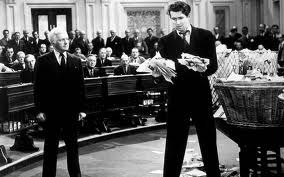 I admit it – I am a romantic. I grew up with my view of the Senate of the United States colored by Frank Capra's tale (and Jimmy Stewart's portrayal) of the trials and tribulation of Jefferson Smith in Mr. Smith Goes to Washington. This holds especially true for my view of the filibuster. Filibusters should look like what Jeff Smith did — one man, standing up in the well of the Senate for what they believe in. But, that hasn't been the case for, at a minimum, the past 4-6 years. As the Brennan Center report on Filibuster Abuse (PDF) demonstrates:
I admit it – I am a romantic. I grew up with my view of the Senate of the United States colored by Frank Capra's tale (and Jimmy Stewart's portrayal) of the trials and tribulation of Jefferson Smith in Mr. Smith Goes to Washington. This holds especially true for my view of the filibuster. Filibusters should look like what Jeff Smith did — one man, standing up in the well of the Senate for what they believe in. But, that hasn't been the case for, at a minimum, the past 4-6 years. As the Brennan Center report on Filibuster Abuse (PDF) demonstrates:
Filibuster Abuse is Rampant: As of October 2012, the current Congress has enacted 196 public laws, the lowest output of any Congress since at least World War II. This is not purely the result of divided party control of chambers. Control of the House and Senate was also divided from 1981 to 1987 and 2001 to 2003. The current Senate passed a record-low 2.8 percent of bills introduced in that chamber, a 66 percent decrease from 2005-2006, and a 90 percent decrease from the high in 1955-1956. Cloture motions — the only way to forcibly end a filibuster — have skyrocketed since 2006, creating a de facto 60-vote requirement for all Senate business. In the last three Congresses, the percentage of Senate floor activity devoted to cloture votes has been more than 50 percent greater than any other time since at least World War II, leaving less time for consideration of substantive measures. On average, it has taken 188 days to confirm a judicial nominee during the current Congress, creating 32 “judicial emergencies,” as designated by the Office of U.S. Courts. Only at the end of the congressional term in 1992 and 2010 have there been more judicial emergencies.
I'm not going to pretend to look at the issue in all its complexity here, but I do wish to look at one aspect of reform efforts that many have fixed upon — the talking filibuster — and contrast that with the proposal towards which, according to Politico , Harry Reid is leaning.